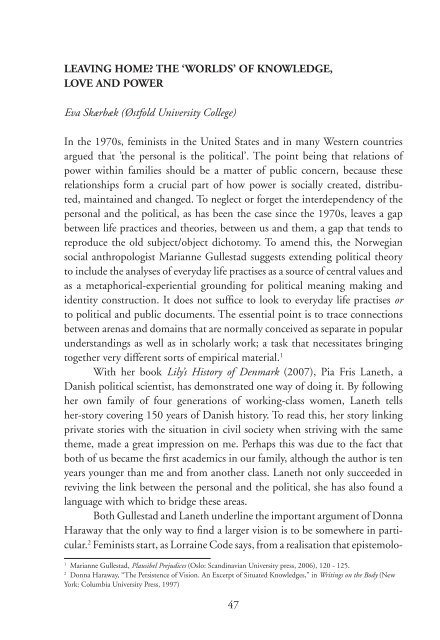Teaching Subjectivity. Travelling Selves for Feminist ... - MailChimp
Teaching Subjectivity. Travelling Selves for Feminist ... - MailChimp
Teaching Subjectivity. Travelling Selves for Feminist ... - MailChimp
Create successful ePaper yourself
Turn your PDF publications into a flip-book with our unique Google optimized e-Paper software.
LEAVING HOME? THE ‘WORLDS’ OF KNOWLEDGE,<br />
LOVE AND POWER<br />
Eva Skærbæk (Østfold University College)<br />
In the 1970s, feminists in the United States and in many Western countries<br />
argued that ’the personal is the political’. The point being that relations of<br />
power within families should be a matter of public concern, because these<br />
relationships <strong>for</strong>m a crucial part of how power is socially created, distributed,<br />
maintained and changed. To neglect or <strong>for</strong>get the interdependency of the<br />
personal and the political, as has been the case since the 1970s, leaves a gap<br />
between life practices and theories, between us and them, a gap that tends to<br />
reproduce the old subject/object dichotomy. To amend this, the Norwegian<br />
social anthropologist Marianne Gullestad suggests extending political theory<br />
to include the analyses of everyday life practises as a source of central values and<br />
as a metaphorical-experiential grounding <strong>for</strong> political meaning making and<br />
identity construction. It does not suffice to look to everyday life practises or<br />
to political and public documents. The essential point is to trace connections<br />
between arenas and domains that are normally conceived as separate in popular<br />
understandings as well as in scholarly work; a task that necessitates bringing<br />
together very different sorts of empirical material. 1<br />
With her book Lily’s History of Denmark (2007), Pia Fris Laneth, a<br />
Danish political scientist, has demonstrated one way of doing it. By following<br />
her own family of four generations of working-class women, Laneth tells<br />
her-story covering 150 years of Danish history. To read this, her story linking<br />
private stories with the situation in civil society when striving with the same<br />
theme, made a great impression on me. Perhaps this was due to the fact that<br />
both of us became the first academics in our family, although the author is ten<br />
years younger than me and from another class. Laneth not only succeeded in<br />
reviving the link between the personal and the political, she has also found a<br />
language with which to bridge these areas.<br />
Both Gullestad and Laneth underline the important argument of Donna<br />
Haraway that the only way to find a larger vision is to be somewhere in particular.<br />
2 <strong>Feminist</strong>s start, as Lorraine Code says, from a realisation that epistemolo-<br />
1<br />
Marianne Gullestad, Plausibel Prejudices (Oslo: Scandinavian University press, 2006), 120 - 125.<br />
2<br />
Donna Haraway, “The Persistence of Vision. An Excerpt of Situated Knowledges,” in Writings on the Body (New<br />
York: Columbia University Press, 1997)<br />
47

















